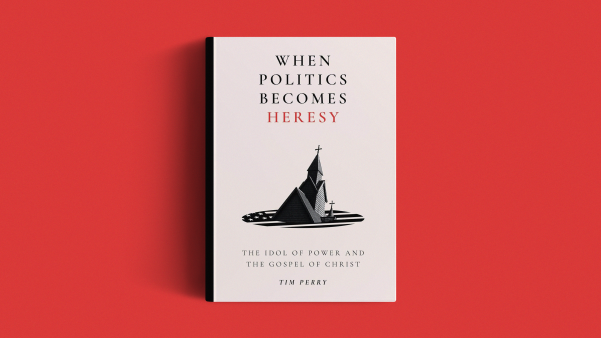In the film Dr. Zhivago there is a scene in which Strelnikov and Yuri Zhivago discuss Yuri’s poetry and his future private life in Varykino, and two short sentences from that scene have burned a brand-like impression upon my mind. Strelnikov, in reacting to Yuri’s poetry and ambitions, says, “The personal life is dead in Russia. History has killed it.”
I wanted to reject the implications of these words, but deep inside I realized something of their meaning, not only for Russia but for all contemporary life. For we live in a world that seeks to strip us of the personal. The forces of our age appear to make life look absurd, to undermine the sense of purpose in existence.
What are the forces of depersonalization in our time? There are at least four, and the Christian believer can scarcely enumerate them without sensing the dramatic counter-force of the resurrection message.
One depersonalizing factor has been the scientific revolution. Science has given man the objective method, and man has been able to assert his power and authority over the materials of his world. The mountains have yielded their iron, gold, and uranium. The power of water has been harnessed. The oceans have been imprisoned within the lines of latitude and longitude, and the wonder of air has been captured by the isobars of the meteorologist. Man is the undisputed ruler of his world.
But this same tool with which he has split the atom and invaded space is also the weapon that threatens man himself. For he is a part of the world he seeks to dominate. The empirical process by which he elevates himself to the position of lord of the whole earth informs him that he is merely a temporary chemical episode in the life of one of the minor planets. Man has organized his world into categories of thingness so he can force it to serve his imaginative desires, but in the process he has discovered that he himself is a thing. The king on the throne of the universe finds himself just another statistic.
A second force threatening the personal is the population explosion. In a sense this is the problem of our age. Sir Julian Huxley, the distinguished English biologist, says it raises the whole question, “What are people for?” He points out that the tremendous increase in the quantity of people “is increasingly affecting the quality of their lives and their future, and affecting it almost wholly for the worse” (The Humanist Frame, p. 24). Georg Borgstrom, professor of food science at Michigan State University, has declared, “As things now stand we seem to face the alternative of nuclear annihilation or universal suffocation” (The Hungry Planet, p. viii).
With a world on the edge of famine it seems somewhat shortsighted to get greatly excited about individual freedom, civil rights, student rights, and human dignity. Until the population problem is solved, we will continue to be threatened by a growing impersonalness. Our lives will become more and more regimented merely for the sake of survival. Government will almost inevitably become bigger and bigger. We will become increasingly subjected to the IBM numbers game and the mentality of thingness.
Another depersonalizing force is one we impose on ourselves. Each of us is at times guilty of self-inflicted depersonalization. Refusal to involve ourselves deeply with other persons can depersonalize us as human beings. Reuel Howe has written in The Miracle of Dialogue, “Communication means life or death to persons” (p. 4). Many of us find it hard to enter into more than superficial relationships with others. Therefore we feel cut off from the intimacy that makes life significant. Self-revelation is indeed difficult—often dangerous, for it is easy to be misunderstood. There are times when we want to reveal to another person our anxieties, our fears, our sins, our hopes, our ambitions, but we are afraid of what he may think. We are afraid he won’t accept our ideas, or will laugh at us. We know from experience that this can happen; we have known what it is to be misunderstood and rejected. And so we have withdrawn into our separate boxes, hiding our true selves from other persons. In this withdrawal we find ourselves even more miserable.
Communication with others is made difficult because of our broken relationship with God. Our sinful condition imposes upon us a style of life that alienates and separates us from our brothers. Fear, suspicion, and anxiety cripple our ability to reveal ourselves to others. At a certain point in a relationship we may break the communication out of fear of being known. Or the other person may withdraw, frightened by the forthcoming revelation.
The ultimate force that seeks to depersonalize us is physical death, which cuts us off from other persons and from the physical world, and brings an end to what we know of the self. We would like to take the inevitable fact of death calmly—to regard it as mere cessation of conscious reality. But the thought brings shock and terror. Unless there is life beyond this present life, life seems void of meaning. What is the point of existence for a five-year-old child smashed by a speeding car or slain by a Viet Cong terrorist or burned to death by napalm? If life’s end is merely the coffin, what value is one person’s life in the midst of the history of man?
The pretensions of scientism, the startling increase of population, the fear of self-revelation, and the prospect of death—these all lend support to Strelnikov’s affirmation that the “personal life is dead.… History has killed it.”
Where are we to find hope in this prospect of despair? Our hope lies in the central fact of the Christian faith—the resurrection of Jesus Christ. “I am the resurrection and the life. He who believes in me will live even if he has died; and everyone who lives and believes in me shall never die.” In the person of the resurrected Christ we encounter one who has overcome the power of death. Jesus Christ, the strong Son of God, defeated the ultimate depersonalizing force, physical death. The power that raised him from the dead can overcome the forces of depersonalization in our age.
In an age when scientism seems to reduce individual existence to non-meaning, Jesus Christ, the risen Son of God, provides a different type of criterion for meaning. In him I, a weak human being, see the authentic man, the complete man. I find in him the possibility of my own completed manhood. Christ points to the personal in the midst of the impersonal.
The resurrected Christ also has made possible the Christian Church. His resurrection awakened within the beaten disciples the possibility and the reality of community. The Christian Church, when it is at its best, is a community of concerned people who care about individual persons. It is a community that provides an atmosphere of accepting love in which persons can feel free to be who they really are, to express their fears, their hates, their ambitions, their loves. In this impersonal age the Church can offer the quality of the personal, because it stems from Christ’s victory over the powers of death and depersonalization. And because of this concern for the personal in human life, Christians must take a lead in becoming informed about population problems and begin trying to find solutions.
Thirdly, the resurrected Christ gives us the ability to have meaningful relations with other men. The unregenerate man often uses other people for his own advancement or gratification. He does not have genuine encounters with other persons, and so he often feels terribly alone, isolated from other human beings. However, union with the resurrected Christ makes it possible for one to become a real person—one who lives in open relationships with others. For, indeed, Christ provides the way to other men’s lives. A person in union with Christ is free to reveal himself to others because he has been accepted by God. He need no longer be afraid to risk the chance of involving himself with another person, for his most important relationship—with God—has been made secure by his faith in Christ. God’s total acceptance of a person frees him to become a real person to others.
Finally, Christ’s resurrection makes possible our own resurrection from the dead. The entire message of the Gospel is that sin and death in Christ have been defeated. Death no longer has dominion over men, for Christ in his death and resurrection defeated the powers of death. Death need not be a depersonalizing force; the risen Christ is indeed the resurrection and the life. He holds out the promise of eternal life with God to all his disciples. The resurrection is our hope.
For some the personal may be dead, but for the children of God it is very much alive and present in the Son of God. The resurrected Christ through his risen person, through his Church, through our union with him, and through his own resurrection power provides a conquering force over the depersonalizing forces of our age. If we want to experience the personal in our own lives, we must meet Jesus Christ. In him we discover what it means to be a person. When we meet him, we are known and we know; we are loved and we love; we are accepted and we accept. To experience the personal is to experience the resurrected Christ at work within us.
Milton D. Hunnex is professor and head of the department of philosophy at Willamette University, Salem, Oregon. He received the B.A. and M.A. degrees from the University of Redlands and the Ph.D. in the Inter-collegiate Program in Graduate Studies, Claremont, California. He is author of “Philosophies and Philosophers.”










